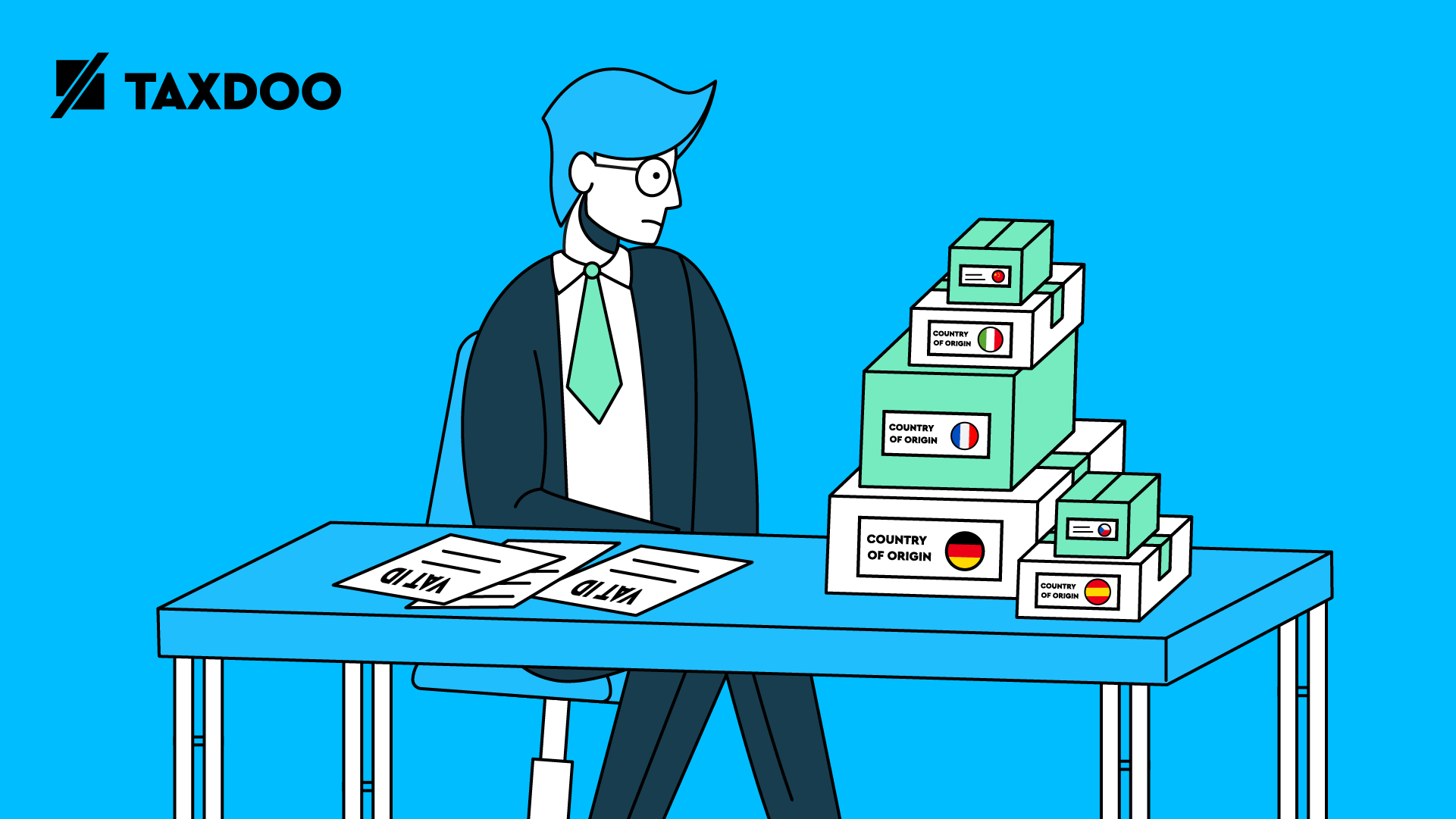Marketplace liability and Amazon: check the VAT.-IDs of all Amazon sellers

Many online traders who sell their goods on online marketplaces will have noticed in recent weeks that their Value Added Tax identification numbers (VAT.-IDs) have been checked for validity by the marketplace operators, e.g. Amazon, ebay and Zalando.
In recent days, it has become known that especially the verification of VAT.-ID numbers by Amazon leads to many practical problems and challenges.
Thousands of traders are informed by Amazon with generic emails that there are problems with their VAT number.
We clarify:
- What is behind the emails from Amazon with reference to the (failed) check of the Value Added Tax ID for validity?
- What should you do as a trader after receiving the message?
Let’s start with the question of why Amazon and other marketplaces check the VAT.-IDs of their traders.
Tightening marketplace liability to curb Value Added Tax fraud
On 01.07.2021, in addition to the abolition of local delivery thresholds for cross-border B2C deliveries and the introduction of the One Stop Shop and the Import One Stop Shop (IOSS), a tightening of the so-called marketplace liability also came into force in Germany, unnoticed by many.
The concept of marketplace liability has already existed in Germany since 2019. In principle, marketplace liability means that marketplaces such as Amazon, ebay, Zalando and Co. are liable for the unpaid Value Added Tax of online traders liable to pay tax in Germany.
This means that if an online trader does not fulfil his tax obligations and does not pay the Value Added Tax on deliveries made in Germany, the tax office will turn to the marketplace where the sale was made.
The driving force behind the tightening of marketplace liability in 2021 is in particular the fact that enormous VAT fraud is still being committed on online platforms. Above all, traders from third countries sell their goods in Germany via marketplaces. The following problems frequently arise in this context:
- These traders do not register for tax purposes in Germany and therefore do not deduct Value Added Tax on the sales made, or
- Although these traders register in Germany, they only pay a fraction of the actual Value Added Tax , as the German tax authorities currently do not have the technology to analyse mass data in e-commerce.
But if Amazon and Co. were directly liable for every cent Value Added Tax , wouldn’t the risk for the marketplaces be incalculable?
How do marketplaces like Amazon avoid actually being liable for unpaid Value Added Tax by their traders?
Is there a way for the marketplaces to avoid liability for the Value Added Tax not paid by traders?
The answer is: Yes!
Until mid-2021, marketplaces avoided liability if they could produce a 22f certificate from traders. The 22f certificate was issued in paper form by the tax office at the request of the trader and confirmed that the trader had a Value Added Tax registration.
Therefore, until mid-2021, the rule at Amazon was: If a trader did not have a 22f certificate in his seller account, he was threatened with account blocking.
It was already clear in 2019 that the 22f paper certificate should only be a transitional solution. As of 01.07.2021, the procedure by which marketplaces can exempt themselves from direct liability has changed.
Abolition of the 22f certificate
With the tightening of the marketplace liability as of 01.07.2021, the 22f certificate known to you so far will cease to exist.
However, the Federal Ministry of Finance has created a transitional regulation in its letter of 21.04.2021. This transitional regulation states that in the period between 01.07.2021 and 15.08.2021, it will not be objected if the marketplace continues to hold a 22f certificate.
In plain language: At the latest since the expiry of a transitional period on 15 August 2021, the 22f certificate is passé. You no longer need to deposit it, Amazon can no longer do anything with it.
But what comes next?
Marketplace must ensure valid VAT.-ID of traders
As of 01.07.2021, marketplaces will therefore no longer be able to avoid liability for unpaid Value Added Tax by traders by means of a 22f certificate.
Instead, the new regulation stipulates that marketplaces are only not liable if the trader selling the goods has a valid Value Added Tax identification number at the time of delivery.
What does this mean for marketplaces?
For marketplaces such as Amazon & Co. this means that they have to check the validity of the Value Added Tax identification numbers of the traders on their platform by means of a digital procedure provided by the Federal Central Tax Office (BZSt) especially for this purpose.
Ultimately, it can be said that the Federal Central Tax Office has created a procedure for the qualified verification of German Value Added Tax identification numbers. Before 01.07.2021, only foreign VAT.-IDs could be checked via the BZSt portal. This restriction continues to apply to all companies – except for marketplaces.
Marginal note:
Marketplaces can only participate in this confirmation procedure, which is regulated in § 18e No. 3 UStG, if they fulfil the requirements for this and have registered for the procedure. In summary, a marketplace must prove to the tax office that it really is a marketplace. The tax office itself decides exactly what this verification looks like.
Among other things, this requires the marketplace itself to be registered for VAT in Germany.
Incidentally, such a regulation also exists in other Member States, such as Austria, France and Italy. In these countries, too, a valid trader-VAT-ID is necessary so that a marketplace can avoid liability for unpaid Value Added Tax .
You must therefore have a valid VAT.-ID on the marketplaces since 16.08.2021 at the latest if you do not want to risk having your account blocked.
That sounds easier than it is. As we all know, the devil is in the detail.
Tightening of marketplace liability has serious consequences for marketplaces and traders
One might think that the tightening of marketplace liability, which provides for a qualified query of the VAT.-IDs of online traders by the marketplace, ostensibly hits the marketplaces.
Marketplaces must integrate the qualified confirmation query of the German Value Added Tax identification numbers into their processes and implement it technically.
This has this impact on the processes of the marketplaces in particular:
- Implementation of a technical solution for automated VAT-ID verification
- Master data management of online retailers
- Establishment of processes in case of failure of the validation of the VAT-IDs
However, the last point in particular shows that the tightening of marketplace liability not only affects the marketplaces themselves, but also you as an online trader.
Amazon is currently struggling with failed validations and should actually have blocked thousands of merchant accounts since 16.08.2021.
VAT.-ID Check by Amazon: Last reprieve by Amazon to clean up master data for traders
Many sellers are currently unsettled by various messages for checking their VAT.-ID that they receive from Amazon .
Apparently, many queries of the VAT.-IDs failed or did not lead to a qualified confirmation by the BZSt on Amazon’s side.
What is surprising, however, is that Amazon has sent the following message not only to those traders for whom the query of the VAT ID was not successful, but to all traders.
Apparently, the qualified verification of the VAT IDs in the seller master data fails for a large number of traders. This can have the following reasons:
- Address of the trader at the BZSt (Federal Central Tax Office) does not match the seller master data at Amazon .
In some cases, the seller data at Amazon is not up to date or has been entered in the wrong place. This can cause the VAT ID check to fail. - Fantasy names at Amazon and company names at the tax office.
Sellers used an imaginary name when registering their business, because the trade offices are quite permissive. Then the name was also used as the company name at Amazon . However, the tax office and the BZSt have a company name on file and not an invented name. This means that the VAT ID check cannot be successful. - Change format of seller data at Amazon.
Amazon also has some old problems with seller master data, because the format of the old seller data was different from that of the new data. For example, in many old data, the street names ended up in the Address Supplement field and the postcode in the P.O. Box field. Even then, a VAT ID check fails.
It can be assumed that thousands of Amazon traders are experiencing the above problems, so Amazon has simply sent the above message to all traders.
It is also interesting that Amazon grants traders a grace period until 15.10.2021 to clean up the master data in connection with the VAT-ID check. As described above, the Federal Ministry of Finance only provides for a transitional arrangement until 15.08.2021. It is therefore questionable how Amazon intends to avoid liability in the period from 15.08.2021 to 15.10.2021.
SoAmazon is deliberately taking the risk of liability here because the online giant may be aware that its own processes for checking VAT IDs may not yet be fully developed and that it therefore deliberately does not want to block thousands of merchant accounts.
Future tax audits and Value Added Tax special audits will thus also have increased prospects of additional results from liability cases for this period.
But back to the notification from Amazon: What should you do when you receive this message?
Do your master data in the Amazon Seller Account match the company name, address and VAT ID filed with the BZSt?
Of course, many of you are now worried that the failed VAT ID check will, in the worst case, lead to your account being blocked at Amazon . However, you should not panic and start changing your seller data at Amazon .
In the worst case, the change of central seller data can lead to a validation process being triggered at Amazon . Once this validation process is initiated, it is open how long it will take and whether it will also temporarily block your account. As soon as this validation process is initiated, it is unclear how long it will take and whether, in case of doubt, it will also lead to a temporary blocking of your account.
Therefore, in case of doubt, we recommend that you remain calm and check the data in Seller Central for correctness and completeness. In any case, it is advisable to compare the data stored in Seller Central with the data at the BZSt in order to identify and, if necessary, correct any discrepancies.
Own query of the data stored at the BZSt on your VAT ID
If you want to make sure that the company name and address stored at the BZSt for your VAT ID are correct, you can also request your data from the BZSt yourself using a contact form.
It may well be that discrepancies have crept into the transmission of your data from the initial company registration at the local tax office to the BZSt. This is especially true if your company has been in existence for some time and the data transfer from the tax office to the BZSt was not yet fully digital.
In case of incorrect data at the BZSt, you can ask for a correction of the data via the contact form linked above.
If the data for your VAT ID at the BZSt is correct, but there is a discrepancy with the data stored at Amazon , you should adjust the data in the seller account. If the data match, you have done your part for a successful confirmation of the validity of your VAT ID.
Weitere Beiträge

VAT identification number and country of origin for Intrastat reporting: New requirements from 2022

Amazon’s Value Added Tax calculation service (VCS) and OSS
